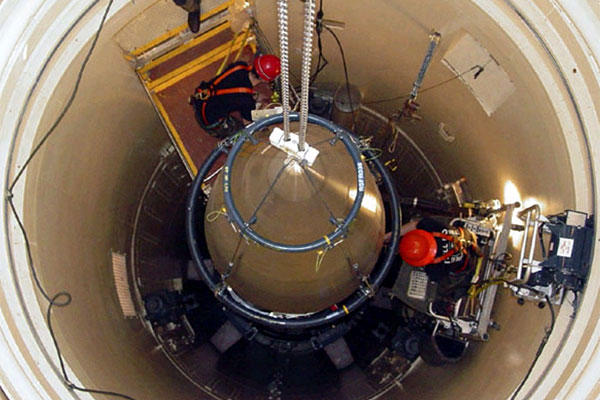The head of Air Force nuclear forces on Tuesday said the command has bounced back from last year's scandal that saw nine officers fired and dozens of other missile officers disciplined in connection with cheating on proficiency tests.
The Air Force has since responded to the cheating scandal with a string of initiatives to address what service officials described as a morale issue. The Air Force secretary announced Monday a plan to raise manning levels to 100 percent for eight critical specialties, giving enlisted airmen more responsibility and offering incentive pay or bonuses to both nuclear officers and enlisted.
Lt. Gen. Stephen Wilson, commander of Global Strike Command, told reporters at the Air Force Association's Air & Space Conference that vacant slots are being filled as quickly as possible. The positions span the range of jobs, from command post controller, to bomber crew chief, to nuclear weapons maintainers and security forces, he said.
Reaching 100 percent manning "will probably happen over a couple of assignment cycles," Wilson said.
The cheating discovered in 2013 owed its roots in part to a growing belief among a number of missile officers that they had to score 100 on their proficiency tests in order to move on and advance their careers, service officials said.
In addition to those critical specialties, the Air Force has committed under a Force Improvement Program to an increase in manning at Global Strike bases, including 216 airmen at Malmstrom Air Force Base, Montana -- where the cheating scandal broke; 31 at Barksdale Air Force Base, Louisiana; 242 at F.E. Warren Air Force Base, Wyoming; 303 at Minot Air Force Base, North Dakota; and 56 at Whiteman Air Force Base, Missouri.
Additionally, the Air Force has already spent about $160 million on new equipment, spare parts and quality of life improvements at the installations.
The program also establishes new cash incentives for some airmen who support the nuclear mission.
Officers would qualify for special-duty pay of $300 per month and enlisted airmen for bonuses up to that same amount, according to Lt. Col. John Sheets, an Air Force spokesman.
Details are still being worked out, he said. The pay and bonuses are set to become effective on Oct. 1. But even if the additional pay does not start until later, it will be retroactive to Oct. 1, he said.
The cash incentives will be the new normal at the command, said Maj. Gen. Garrett Harencak, assistant chief of staff for strategic deterrence and nuclear intelligence.
"It may be a misnomer because it's a 'program' ... and programs tend to end. We don't see it that way," he said.
Air Force Chief of Staff Gen. Mark A. Welsh III and Air Force Secretary Deborah Lee James "have been clear in spoken word and by what they've done. ... It's consistent, it's persistent."
Another change at nuclear command installations is the responsibility being given to enlisted members.
Officials investigating the cheating scandal found that airmen were deferring decisions to higher-ups, increasingly afraid to make decisions at the lower echelons.
That is being turned around, he said, with a "cultural change of empowerment."
During one presentation at the conference, Welsh showed a photograph of a junior airman and non-commissioned officer loading bombs aboard an airplane. There was no chief and no officer overseeing the work, and that was the point, he said.
"Those airmen know their job and they're empowered to do it. That's what we're trying to do across the board," Wilson said. "And that will be one of the biggest and lasting things that we do."
-- Bryant Jordan can be reached at bryant.jordan@monster.com.





























